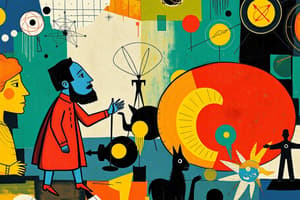Podcast
Questions and Answers
What are the two cultural transformations that will be the focus of this chapter?
What are the two cultural transformations that will be the focus of this chapter?
The scientific revolution and the spreading of Christianity.
Who was Martin Luther? What were the 95 Theses? And what was the Protestant Reformation?
Who was Martin Luther? What were the 95 Theses? And what was the Protestant Reformation?
Martin Luther was a German priest who challenged the Catholic Church's practices. The 95 Theses outlined his complaints against indulgences. The Protestant Reformation was a movement initiated by Luther's ideas that led to the split of the Catholic Church.
Why was the printing press important to the spread of Reformation ideas?
Why was the printing press important to the spread of Reformation ideas?
The printing press allowed for the mass production of pamphlets, which helped disseminate Luther's ideas and translated versions of the Bible.
What are some key differences between Catholicism and Protestantism?
What are some key differences between Catholicism and Protestantism?
What was the cause of the Thirty Years' War? How was it resolved?
What was the cause of the Thirty Years' War? How was it resolved?
What was the purpose of the Catholic Counter-Reformation?
What was the purpose of the Catholic Counter-Reformation?
What was the long-term impact of the Scientific Revolution?
What was the long-term impact of the Scientific Revolution?
Why did the Scientific Revolution occur in Europe rather than in China or the Islamic World?
Why did the Scientific Revolution occur in Europe rather than in China or the Islamic World?
What new understandings about the world came out of the Scientific Revolution? What scientists were associated with each of these ideas?
What new understandings about the world came out of the Scientific Revolution? What scientists were associated with each of these ideas?
How did the Catholic Church respond to the Scientific Revolution? Why?
How did the Catholic Church respond to the Scientific Revolution? Why?
What was the European Enlightenment?
What was the European Enlightenment?
Explain how the idea of progress was thought about during the Enlightenment.
Explain how the idea of progress was thought about during the Enlightenment.
How does cultural borrowing create tensions? Give an example. What are some ways in which these tensions can be eased?
How does cultural borrowing create tensions? Give an example. What are some ways in which these tensions can be eased?
What do you think was the most important idea to come out of this time period?
What do you think was the most important idea to come out of this time period?
Flashcards are hidden until you start studying
Study Notes
Cultural Transformations
- Two significant cultural transformations: the scientific revolution and the spread of Christianity.
Martin Luther and the Protestant Reformation
- Martin Luther: German priest driven by concerns over his salvation and relationship with God.
- The 95 Theses: A document with questions and criticisms aimed at the Catholic Church's sale of indulgences.
- The Protestant Reformation: A movement sparked by Luther's ideas that led to a split in the Catholic Church, establishing Protestantism based on faith alone.
Importance of the Printing Press
- The printing press enabled the mass production of pamphlets, facilitating widespread dissemination of Luther’s ideas.
- Translations of the Bible into German made religious texts accessible to a broader audience.
Catholicism vs. Protestantism
- Catholics adhere to the authority of the pope and practice the Seven Sacraments.
- Protestants emphasize personal Bible reading and a direct relationship with God, asserting salvation through faith alone.
Thirty Years' War
- A destructive conflict between Catholics and Protestants, resulting in a significant population decline in Germany (15-30% due to violence, famine, or disease).
- Resolved by the Peace of Westphalia, which allowed territories to manage their own religious affairs and reshuffled political boundaries.
Catholic Counter-Reformation
- Aimed to reaffirm Catholic principles and address abuses highlighted by the Protestant Reformation.
Long-term Impact of the Scientific Revolution
- Altered perceptions of humanity's place in the cosmos and diminished religious authority and belief, particularly among educated populations in the West.
Factors for the Scientific Revolution in Europe
- Independence of European universities facilitated scholarly pursuits free from church or state control.
- Utilization of knowledge from the Islamic world, including translations of Aristotle and new ideas following the Columbian Exchange.
Key Scientific Discoveries
- Copernicus: Proposed a heliocentric model with the sun at the center of the solar system.
- Kepler: Demonstrated that planets follow elliptical orbits.
- Galileo: Improved the telescope, discovered sunspots and Jupiter's moons.
- Newton: Developed laws of motion and universal gravitation.
Catholic Church's Response to the Scientific Revolution
- Viewed the Scientific Revolution as a threat to its teachings and authority.
- Notable actions included the execution of Giordano Bruno and the forced renunciation of beliefs by Galileo.
The European Enlightenment
- A period characterized by the application of reason and logic to improve human life, questioning traditions and authority.
Enlightenment Perspective on Progress
- Progress was conceived as the potential to change and enhance human society through rational human actions.
Cultural Borrowing and Tensions
- Cultural borrowing can create contradictions, e.g., Islamic teachings conflicting with local polytheistic beliefs.
- Tensions may be mitigated by 'domesticating' foreign ideas, blending them with local customs.
Significant Ideas of the Time
- Emphasis on the scientific method and the concept of constitutional government were pivotal advancements during this period.
Studying That Suits You
Use AI to generate personalized quizzes and flashcards to suit your learning preferences.




